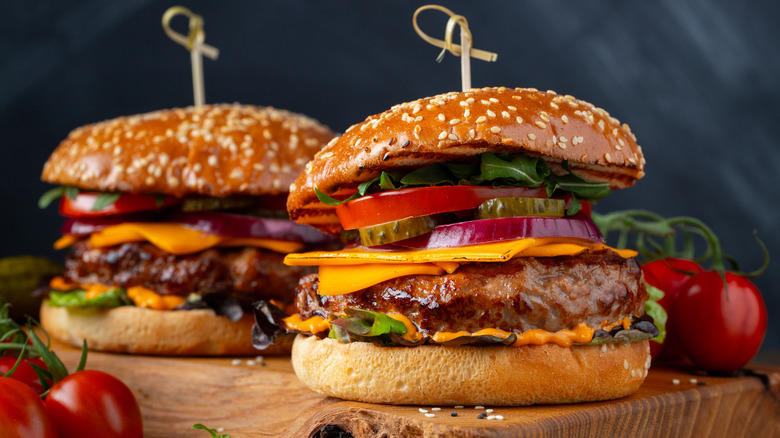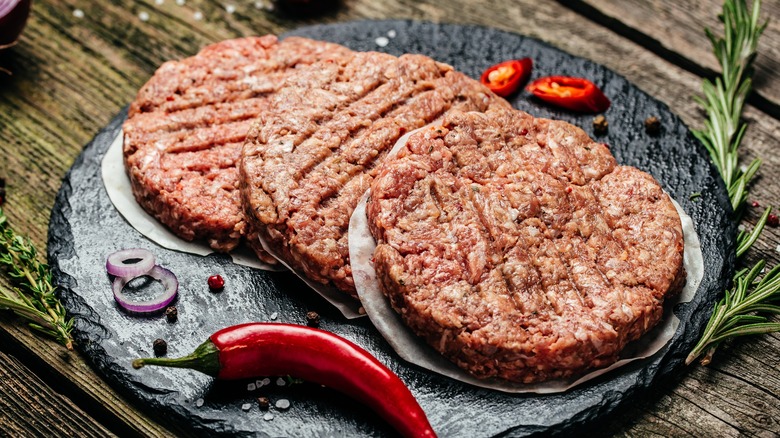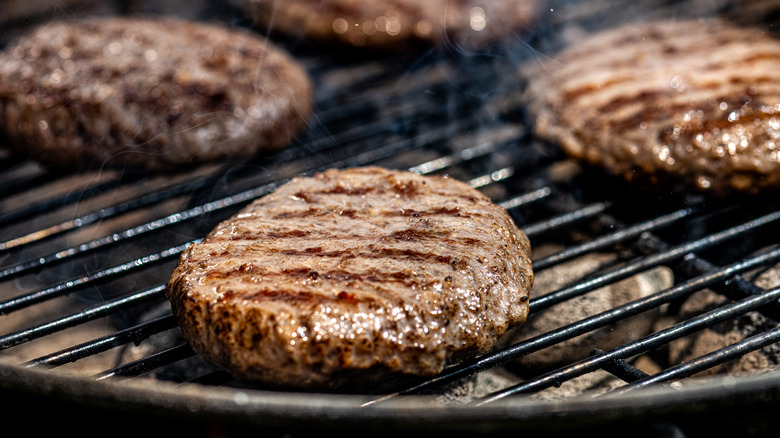Why Marinating Your Burgers Is A Game Changer
Burgers can be bangin' or blah, and it's not just the toppings that'll make or break them. You can impart flavor right into the patties themselves with a solid marinade. While a two-ingredient salt and pepper seasoning will do the trick in a pinch, a juicy marinade can amp up both flavor and moisture.
For burgers, simple is your best bet. You'll want a marinade that is neutral enough to be versatile, but still packs a tasty punch. This ensures the extra ingredients won't overpower any veggies or condiments and takes into account that everyone prefers something different on their burger.
Sauces like Worcestershire, soy, tamari, coconut aminos, or Maggi seasoning — which is made from fermented wheat protein — would all be great choices. Add some tang to the liquid with a dash of balsamic vinegar or squirt of mustard, or jazz it up further wth some garlic powder, onion powder, paprika, or black pepper. But, with a marinade, skip the salt since all those liquids will have plenty of sodium to season the burger well.
How to marinate burgers
To properly marinade your burgers, first start by forming the patties, making sure your ground meat has enough fat to keep it all intact, moist, and flavorful (a ratio of about 80% lean protein to 20% fat is good).
While it can be tempting to mold burgers aggressively and press them into perfect discs, you are really doing a disservice. The more you handle the meat, the tougher it will get, which makes it more likely that you will create a firm, springy, sausage-like texture. Focus on shaping them quickly without squishing or kneading the meat, and don't forget to use the thumbprint trick to keep burgers from turning into meatballs as they cook.
Then, in a wide pan such as a baking dish or sheet tray, combine your marinade ingredients plus a little bit of neutral oil. Place the patties in the dish, give them a flip so both sides are coated, and let them marinate for about an hour. Doing it this way means that the patties can absorb the flavorings evenly without having to combine them into the meat directly, which can present the chance for overworking the mixture.
Tips for making sure your burgers don't fall apart
While there are flavor advantages to marinating burgers, the process itself can affect structural integrity because of the extra liquid involved. To help your burgers keep their shape, gently reinforce the round patties after they're done soaking just in case they loosened up too much while they sat.
Burgers will hold their shape much better if they stay cold, so there is no need to let the meat come to room temperature before cooking. Just remove the burgers from the marinade, place them on a paper towel, and lightly pat the tops dry. This will help you get a good sear (as will making sure your cast iron or steel skillet, grill or grill pan is nice and hot). You can cook burgers directly on cleaned and oiled grates, using high heat, but you can also put a well-seasoned, cast iron skillet on the grill for extra assurance. You'll still get a smoky touch this way, but they will be easier to flip.
Then, place the patty down gently, and don't mess with it! Because the burgers are going to be on the delicate side, they need to develop a crust so they don't fall apart. Let them sear undisturbed for about three minutes before the first flip. The total cooking time will vary depending on the thickness of the patties. For 1-inch burgers, grill for six to seven minutes for medium-rare, seven to eight for medium, and about nine for medium-well.



